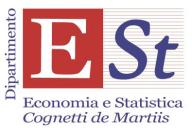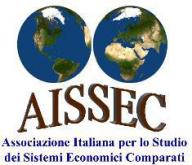Introduction
By Iacopo Maria Taddei[1]
The OEET, in collaboration with the Collegio Carlo Alberto (CCA) and the Department of Economics and Statistics Cognetti de Martiis, held its 10th Workshop on November 28–29, 2024, at the University of Turin. Titled 10 Years of the Turin Centre on Emerging Economies: Lessons Learned and Perspectives for the Future, the event marked a decade since the centre’s founding.
The Workshop featured three thematic sessions on OEET’s core research areas: economic development and inequality, sustainable development and the 2030 Agenda, and emerging economies in global value chains (GVCs). This issue of the OEET newsletter compiles contributions from these discussions, highlighting the challenges faced by emerging economies in fostering inclusive, sustainable growth along with a progressive accumulation of domestic productive capabilities through a strategic insertion into global value chains (GVCs). It also examines the influence of developed countries' policies on these trajectories.
The first section addresses the topic of economic development, growth and inequality in emerging economies. The first article, The Political Economy of Development: A Practitioner’s View by Hans Timmer, references the 2024 Nobel Prize winners Acemoglu, Johnson, and Robinson, highlighting how exploitative institutions hinder long-term growth. While aligning with cross-country studies on equal opportunities and economic success, Timmer argues that inequality stems more from elite capture than efficiency gaps, restricting access to capital and jobs for marginalized groups. He emphasizes the need to challenge vested interests, drawing on his experience at the World Bank.
The second article, Olga Demidova’s Dynamics of Inequality in the Regions of Russia (2013–2023) examines regional inequality trends in Russia, revealing a slow decline and early signs of a Kuznets curve pattern. Maurizio Bussolo follows with his contribution Economic Inequality: Evolving Perspectives and Future Developments, an overview of future research directions on inequality and economic growth.
The second section shifts the focus to sustainable development in emerging and developing countries. Building the Economies of the Future by Piergiuseppe Fortunato underscores the urgency of climate action, arguing that the energy transition must go beyond carbon mitigation to support economic transformation. He calls for stronger global governance to help developing countries build climate-resilient economies.
Sara Balestri and Marcello Signorelli’s SDG Trade-Related Spillovers and EU Regulation on Timber assesses how high-income countries' policies, such as the EU’s deforestation-free regulations, can aid low-income nations in achieving forest conservation and sustainability, SDG 15. They analyse the environmental spillovers of international trade, focusing on imported deforestation embedded in European consumption of timber and timber-related commodities. Further contributions include Luca Andriani and colleagues’ contribution Social Capital and CO2 emissions in emerging markets, which analyses social capital in fostering corporate environmental strategies and Samuele Milone’s study on the disruptive impact of natural disasters, such as floods, on education in Thailand, titled The impact of drought on education in rural Thailand: a synergy between SDG-4, SDG-2, and SDG-13.
The third section opened with Alessia Amighini’s presentation of the Stable Food Access and Prices and Lower Exposure to Shocks (STAPLES) project, a PRIMA funded initiative supporting resilience strategies in the Middle East and North Africa (MENA) region involving CCA along with multiple institutions (Politecnico di Milano (POLIMI), the University of Gastronomic Sciences of Pollenzo (UNISG), Ibnou Zohr University of Agadir (UIZ), the Economic Research Forum (ERF), the Euro-Mediterranean Economists Association (EMEA), and one multi-country business network, the Association of the Mediterranean Chambers of Commerce (ASCAME)).
STAPLES aims to support private and public resilience strategies by examining external shocks and stressors from global cereal value chains affecting the Middle East and North Africa (MENA) region. The project focuses on identifying feasible local solutions, particularly in Morocco and Egypt.
Alessia Amighini’s Emerging Economies in Global Value Chains: What Should We Expect for the Future? discusses how emerging economies have deepened their GVC integration since the mid-1990s, reshaping North-North trade. However, this trend slowed in 2018 as U.S. efforts to reduce dependence on China triggered a decoupling process, impacting other emerging economies. Giovanni Graziani further explores this phenomenon in Shifting Away from China Towards Emerging Countries? A Critical Assessment of Economic Decoupling, attempting to track value added flows between these two countries to measure its effective impact.
Finally, in Global Value Chains, Climate Change, and Environment, Chahir Zaki explores the relationship between GVCs and environmental impact. While GVCs contribute to carbon emissions, firms in these networks often adopt better environmental practices. Zaki advocates for eco-friendly trade agreements and stronger national regulations to ensure cleaner trade.
[1] Researcher at the Collegio Carlo Alberto (CCA),









